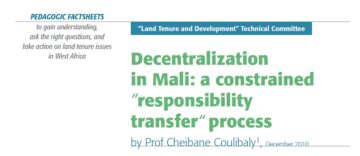
For many observers, the decentralization policy in Mali is one of the most audacious ones in Africa, because of the high number of institutions created: 683 new ”communes“ (in addition to the 19 already existing), 52 ”cercles“, 8 regions and the District of Bamako. The number of those institutions has made the issue of authority, responsibility and resource transfer from the central government to all these levels central to the decentralization process. The following two critical questions also arise in the meantime: What are the privileges of the so-called traditional institutions created by local people at the village level (”fractions“ and ”quartiers“) and between villages? What kind of cooperation should exist between these institutions and the government units? This brief highlights the achievements of the decentralization policy in Mali and the constraints the latter faces. Then it outlines some possible solutions to address these challenges.

Rejoignez-nous sur
LinkedIn X Facebook